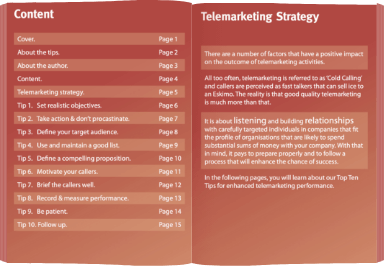Listen to the podcast
Rejection and hurdles are facts of life. Get over it! Brutal perhaps but it is pretty much true. From the time your mother stopped you crawling too near to the fire or refused to give you ice cream until you finished your tea, we have all had to get used to the word NO. As an adolescent, I had the odd rejection or two from the opposite sex to build my strength of character. Add to that the inevitable cycle of job interviews and the ‘thanks for your application but…..’. You get the picture. In life, we have to get used to rejection.
In sales, one could argue that you get more knock-backs than most. Coupled with inevitable objections that you need to handle, this makes most sales jobs quite demanding, to say the least. And, within sales, cold-callers tend to get more kicks in the teeth than most.
So, what’s the secret? How do you deal with those inevitable knockbacks? Below are our 10 tips for developing a strategy to manage and reduce rejection in cold calling.
-
Prepare, prepare, prepare
We don’t mean to prepare for rejection. However, it’s also important to learn not to let it affect you. What we mean here is that the more prepared you are for the call the better. That involves market and sector knowledge. It means understanding the challenges that your product or service solves. Cold callers need to understand what floats the boat of prospective customers. The more you understand this, the better it will be. You can’t prepare for every question and every situation. However, the more time you spend on your approach and working on likely objections in advance of the calling cycle the better. It will be time well-invested.
-
It’s about the customer not you
Often, rejection is down to the person, not the proposition. What we mean by that is that a poor salesperson is primarily only interested in selling. Customers want to feel you’re interested in them. If you talk and pitch at them you’ll come across as self-centered and, as a typical cold-caller. Work out what’s important to your customer and relate your offering to that. Be genuinely interested in the prospect. Customers aren’t interested in what you do. They’re interested in what you can do for them. So, break the typical seller-buyer cycle and you’ll be less likely to hear the phone being slammed down.
-
Build rapport
Communication is key. Listening is crucial. So is asking good questions that stop you talking and demonstrate interest. The more you build rapport, the less likely you’ll get a flat No. Engaged customers don’t intentionally block. If the conversation is relevant, they will divulge information and allow you to propose solutions. Without rapport from the outset, it’s likely that the call will be short and you certainly won’t achieve a positive outcome.
-
Work out your intro
We all know that first impressions count. The better your opening gambit, the less you’ll pave the way for rejection. Plan what you want to say but use natural language (not sales-speak) and ensure it’s short, engaging and compelling. If you get the ear of the prospect early on, even if they aren’t ultimately interested now, you’ll at least keep the door open for future opportunities with that potential customer.
-
Work on your attitude
We’ve all come across callers that immediately go into an offensive mode when confronted with objections and possible rejection. The skill is to remain calm. It’s important to recognize that it’s rarely personal. Ask yourself what you contributed to this particular negative reaction. Was it a poor intro or a weak tone of voice? Use good questions (if allowed) to establish why what you’re offering isn’t of interest. The expression ‘water off a duck’s back’ is partly true here. Yes, you should be able to move on and don’t let it get you down. Equally, you shouldn’t display an arrogant or uncaring approach. Your attitude should be positive at all times. After all, you represent your company and business brand and may want to do business with this prospect in the future.
-
Get some armor
If you struggle with rejection, you may be in the wrong game. You will often be up against strong competitors and you can’t win them all. So, whilst remaining upbeat, you must have a sufficiently robust disposition to dust yourself off and go again. After all, the next prospect doesn’t know that the previous one rejected you. And, you need enough no’s in selling to get to the next yes. We often say that you’ll never get success with someone you don’t call!
-
Know your ratios
Sales is partly a numbers game and it’s likely, in many sales scenarios, that you will lose more than you win. Understand your ratios and how many calls it takes to make a sale. The more you know your numbers, the less you’ll focus on individual cases. Of course, you need to give maximum effort to each call. But, if you know what it takes to generate an opportunity, you’ll focus more on what it takes to get results rather than becoming stuck in a negative cycle after negative calls.
-
Use positive self-talk
I once read a terrific book called ‘What to say when you talk to yourself’’ It explains how negative thinking can create a spiral. It can affect your whole body. Conversely, positive self-talk can create stunning results even in adversity. Also, check out our blog on when life gives you lemons. Sales is a results business and, as the old expression, it’s garbage in garbage out. If you feed your brain negatively, it affects your approach, your tone, your language, and how you come across. So, practice positive self-talk (especially after rejection) and you’ll experience less rejection in the first place.
-
Expect success
Similar to the above, if you believe you can, you will. If you think you can’t, you most probably won’t. Typically, the best salespeople are upbeat. They believe they’re great, their products are great and the prospect needs what they offer. They expect to pulverize targets and don’t let anything stand in their way. They put in the man-hours. They go above and beyond. A good expression that is very true in cold-calling terms is ‘behaviour breeds behaviour’. If you act like a winner, you’ll attract success.
-
If all else fails, find a mentor (or find another profession!)
Few people are up all of the time and some of the more outgoing personalities hide their personal doubts behind a mask. So, if you’re genuinely having a bad day or a bad run, find someone that can help. It could be your boss. A colleague might help offer support. Someone outside of the office could bring extra motivation. It could be that some refresher training might be useful. Ultimately, you need someone that will listen, ask the right questions and encourage you to do better. Don’t get caught in a negative whirlpool by associating with other people in the same downward spiral. That will compound the problem, Get yourself in front of someone that believes in you and makes you feel better about yourself.
Sales is a people business and people buy people. Therefore, if you can maintain your positive attitude and apply the principles we’ve discussed in this blog, not only will you be better placed to handle rejection, you’ll experience less rejection in the first place.
If you’d like to know how GSA Business Development can help generate growth for your business through social media lead generation or telemarketing or you’d like to book one of our new business development and marketing strategy workshops, contact us now on 0845 658 8192 or use the form on this site.






